What's New
Displaying results 611 - 620 of 4052

Resource | Infographics,
Girls and women make up more than half of the 37.9 million people living with HIV. Ending AIDS by 2030 requires that we address girls’ and women’s diverse roles by putting them at the centre of the response.

Resource | Infographics,
There are 37.9 million people living with HIV. 79% know they are HIV-positive. The rest do not. Three out of five people living with HIV are on antiretroviral therapy. Only 53% of people living with HIV have undetectable levels of the virus.
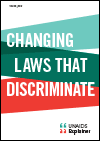
Resource | Publications,
States have a moral and legal obligation—under the Universal Declaration of Human Rights, human rights treaties, the 2030 Agenda for Sustainable Development and other international obligations—to remove discriminatory laws and to enact laws that protect people from discrimination.
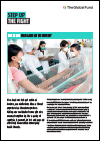
Resource | Publications,
Microbes do not stop at national borders, so an infectious disease threat anywhere is a threat everywhere. Making our world safer from epidemics means strengthening the capacity of countries to prevent, detect and respond effectively to current and emerging health threats.
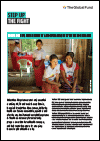
Resource | Publications,
Robust health systems are not only essential to ending HIV, TB and malaria as epidemics, they yield broader health outcomes, delivering health services in a sustainable, equitable and effective way. Resilient and sustainable systems for health are necessary for accelerating progress toward universal health coverage, and help countries prepare for emerging threats to global health security.
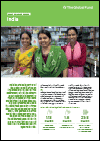
Resource | Publications,
India is a strategic partner of the Global Fund, both as an implementer and a donor. The government of India has shown great leadership in improving the health needs of its citizens and fighting infectious diseases, especially tuberculosis. India has ambitious goals for all three diseases, including ending TB by 2025 – five years ahead of the Sustainable Development Goals. Since 2002, the Global Fund has disbursed US$2.1 billion in programs to fight HIV, TB and malaria and strengthen health systems in India.
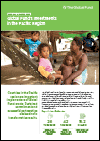
Resource | Publications,
The Global Fund is partnering with governments, medical experts, advocates, civil society and communities affected by HIV, TB and malaria to fight the three diseases and build resilient and sustainable systems for health. As of May 2019, the Global Fund partnership has invested a total of US$366 million in 14 island countries in the Pacific region.
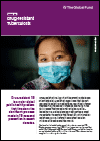
Resource | Publications,
Drug-resistant TB is part of the growing challenge of antimicrobial-resistant superbugs that do not respond to existing medications, resulting in fewer treatment options and increasing mortality rates for illnesses that would ordinarily be curable – including TB. Global development partners must move faster to contain this threat of antimicrobial resistance (AMR) before it escalates to claim millions of lives around the world.
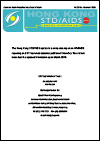
Resource | Publications,
The Hong Kong STD/AIDS update is a composite report on HIV/AIDS reporting and STI caseload statistics published 3 monthly. The current issue has the updated information up to March 2019.
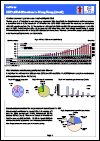
Resource | Fact Sheets,
The first case of HIV infection in Hong Kong was reported in 1984. As of 2018, the Department of Health has received a cumulative total of 9,715 reports of HIV infection and 1,996 AIDS cases under the voluntary and anonymous HIV/AIDS reporting system. The number of HIV reports in 2018 was 624, 8% decrease compared to the 681 cases in 2017. People infected with HIV progress to AIDS when they suffer from clinical complications of severe immunodeficiency due to HIV. In 2018, 139 AIDS reports were received. The most common illnesses presenting at AIDS were Pneumocystis pneumonia and tuberculosis.





